英国脱欧--英语演讲[优质ppt]
- 格式:ppt
- 大小:4.50 MB
- 文档页数:14

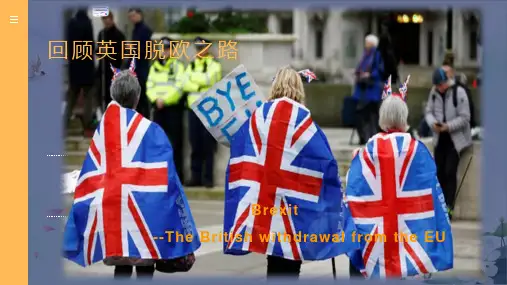

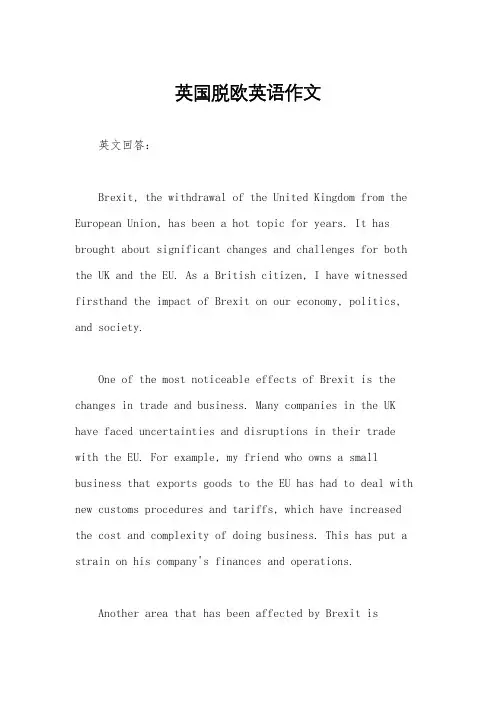
英国脱欧英语作文英文回答:Brexit, the withdrawal of the United Kingdom from the European Union, has been a hot topic for years. It has brought about significant changes and challenges for both the UK and the EU. As a British citizen, I have witnessed firsthand the impact of Brexit on our economy, politics, and society.One of the most noticeable effects of Brexit is the changes in trade and business. Many companies in the UK have faced uncertainties and disruptions in their trade with the EU. For example, my friend who owns a small business that exports goods to the EU has had to deal with new customs procedures and tariffs, which have increased the cost and complexity of doing business. This has put a strain on his company's finances and operations.Another area that has been affected by Brexit isimmigration. The UK's departure from the EU has led to changes in immigration policies and the status of EU citizens living in the UK. I have a colleague who is from Poland and has been living in the UK for many years. She had to apply for settled status to ensure that she can continue to live and work in the UK after Brexit. The uncertainty and bureaucracy surrounding the application process have caused her a lot of stress and anxiety.Furthermore, Brexit has also had political and social implications. The issue of Brexit has divided the country and has led to heated debates and disagreements among the public. People have strong opinions on whether Brexit is beneficial or detrimental to the UK. This has created a sense of division and polarization in our society, which has made it challenging to have constructive conversations about the future of our country.中文回答:脱欧,即英国退出欧洲联盟,多年来一直是热门话题。

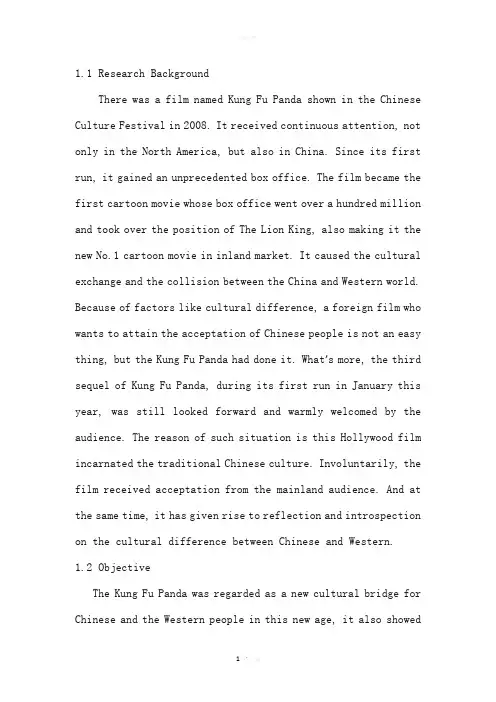
1.1 Research BackgroundThere was a film named Kung Fu Panda shown in the Chinese Culture Festival in 2008. It received continuous attention, not only in the North America, but also in China. Since its first run, it gained an unprecedented box office. The film became the first cartoon movie whose box office went over a hundred million and took over the position of The Lion King, also making it the new No.1 cartoon movie in inland market. It caused the cultural exchange and the collision between the China and Western world. Because of factors like cultural difference, a foreign film who wants to attain the acceptation of Chinese people is not an easy thing, but the Kung Fu Panda had done it. What’s more, the third sequel of Kung Fu Panda, during its first run in January this year, was still looked forward and warmly welcomed by the audience. The reason of such situation is this Hollywood film incarnated the traditional Chinese culture. Involuntarily, the film received acceptation from the mainland audience. And at the same time, it has given rise to reflection and introspection on the cultural difference between Chinese and Western.1.2 ObjectiveThe Kung Fu Panda was regarded as a new cultural bridge for Chinese and the Western people in this new age, it also showeda new cognition of China that Western people have recently attained now. The film director once said, “We had prepared this movie for over ten years, every one of us had a heroic dream of defeating evil and be the helper of the weak in our childhood time. And as my own self, I am crazy about Chinese culture and Chinese Kung Fu. Thus, the creative idea of the Kung Fu Panda came up to me gradually. In other words, Kung Fu Panda is my very own lover’s letter to China.” In this film, the Chinese culture is expressed incisively and vividly, the manifestation of differences and collisions between the Chinese culture and Western culture can be spotted everywhere in this film, which is meant to attract the audiences whether they are Chinese or not. This thesis of this study is to recognize the different culture between Chinese and Western; and from the cultural transmission of Kung Fu Panda, to discuss the difference between Chinese and Western culture. Therefore, this thesis hasa definite practical significance.1.3 Significance of the ThesisThis thesis studies different cultures between Chinese and Western from the film, Kung Fu Panda. The aspect of the film is to present the results after comparing the two sides of culture. The film has a good cultural fusion of Chinese andWestern culture; certainly, we could easily find out that the character syllogism of panda is innovated by Western. And also, as for our national film development, it has set a good example to be compared to.1.4 The Organization of the ThesisThis thesis is divided into four parts, starting with research background, and introduces the main contents of the thesis. The second part is the literature review, including three parts: the synopsis, the main culture difference between Chinese and Western, and the discrepancy from the Kung Fu Panda expressed of the Chinese and Western world. The discussion mainly narrates the difference about the panda in two national cultures, and the expression of the “dragon”in such two different cultures.欢迎您的下载,资料仅供参考!致力为企业和个人提供合同协议,策划案计划书,学习资料等等打造全网一站式需求。
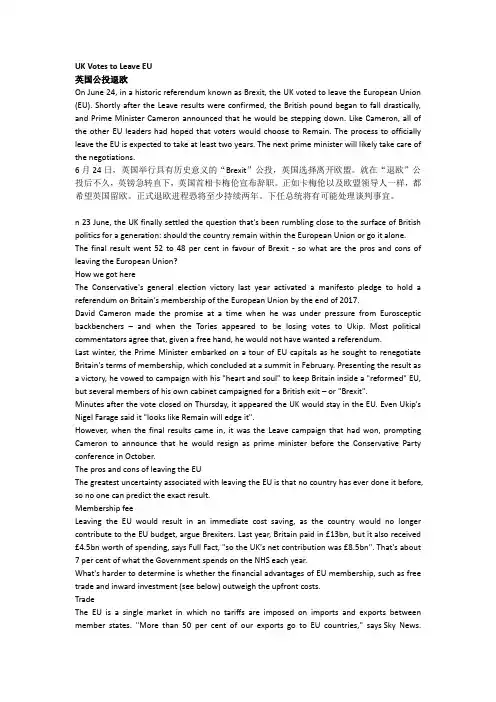
UK Votes to Leave EU英国公投退欧On June 24, in a historic referendum known as Brexit, the UK voted to leave the European Union (EU). Shortly after the Leave results were confirmed, the British pound began to fall drastically, and Prime Minister Cameron announced that he would be stepping down. Like Cameron, all of the other EU leaders had hoped that voters would choose to Remain. The process to officially leave the EU is expected to take at least two years. The next prime minister will likely take care of the negotiations.6月24日,英国举行具有历史意义的“Brexit”公投,英国选择离开欧盟。
就在“退欧”公投后不久,英镑急转直下,英国首相卡梅伦宣布辞职。
正如卡梅伦以及欧盟领导人一样,都希望英国留欧。
正式退欧进程恐将至少持续两年。
下任总统将有可能处理谈判事宜。
n 23 June, the UK finally settled the question that's been rumbling close to the surface of British politics for a generation: should the country remain within the European Union or go it alone. The final result went 52 to 48 per cent in favour of Brexit - so what are the pros and cons of leaving the European Union?How we got hereThe Conservative's general election victory last year activated a manifesto pledge to hold a referendum on Britain's membership of the European Union by the end of 2017.David Cameron made the promise at a time when he was under pressure from Eurosceptic backbenchers –and when the Tories appeared to be losing votes to Ukip. Most political commentators agree that, given a free hand, he would not have wanted a referendum.Last winter, the Prime Minister embarked on a tour of EU capitals as he sought to renegotiate Britain's terms of membership, which concluded at a summit in February. Presenting the result as a victory, he vowed to campaign with his "heart and soul" to keep Britain inside a "reformed" EU, but several members of his own cabinet campaigned for a British exit – or "Brexit".Minutes after the vote closed on Thursday, it appeared the UK would stay in the EU. Even Ukip's Nigel Farage said it "looks like Remain will edge it".However, when the final results came in, it was the Leave campaign that had won, prompting Cameron to announce that he would resign as prime minister before the Conservative Party conference in October.The pros and cons of leaving the EUThe greatest uncertainty associated with leaving the EU is that no country has ever done it before, so no one can predict the exact result.Membership feeLeaving the EU would result in an immediate cost saving, as the country would no longer contribute to the EU budget, argue Brexiters. Last year, Britain paid in £13bn, but it also received £4.5bn worth of spending, says Full Fact, "so the UK's net contribution was £8.5bn". That's about 7 per cent of what the Government spends on the NHS each year.What's harder to determine is whether the financial advantages of EU membership, such as free trade and inward investment (see below) outweigh the upfront costs.TradeThe EU is a single market in which no tariffs are imposed on imports and exports between member states. "More than 50 per cent of our exports go to EU countries," says Sky News.Membership of the bloc means we have always had a say over how trading rules are drawn up. Britain also benefits from trade deals between the EU and other world powers. "The EU is currently negotiating with the US to create the world's biggest free trade area," says the BBC, "something that will be highly beneficial to British business."Britain risks losing some of that negotiating power by leaving the EU, but it would be free to establish its own trade agreements.Ukip leader Nigel Farage believes Britain could follow the lead of Norway, which has access to the single market but is not bound by EU laws on areas such as agriculture, justice and home affairs. But others argue that an "amicable divorce" would not be possible."If Britain were to join the Norwegian club," says The Economist, "it would remain bound by virtually all EU regulations, including the working-time directive and almost everything dreamed up in Brussels in future." And it would no longer have any influence on what those regulations said.Leading Brexit campaigner Boris Johnson, meanwhile, has proposed adopting a Canada-style trade arrangement. "I think we can strike a deal as the Canadians have done based on trade and getting rid of tariffs" and have a "very, very bright future", he said. The idea was quickly dismissed by Cameron at the time, who said it would mean "years of painful negotiations and a poorer deal than we have today".Eurosceptics argue that the vast majority of small and medium sized firms do not trade with the EU but are restricted by a huge regulatory burden imposed from abroad.A study by the think-tank Open Europe, which campaigned to see the EU radically reformed, found that the worst-case "Brexit" scenario is that the UK economy loses 2.2 per cent of its total GDP by 2030 (by comparison, the recession of 2008-09 knocked about 6 per cent off UK GDP). However, it says that GDP could rise by 1.6 per cent if the UK was able to negotiate a free trade deal with Europe –ie to maintain the current trade set-up –and pursued "very ambitious deregulation".Whether other EU countries would offer such generous terms is one of the big unknowns of the debate. Pro-exit campaigners argued that it would be in the interests of other European countries to re-establish free trade, but their opponents suggested that the EU would want to make life hard for Britain in order to discourage further breakaways.France also warned recently that there would be "consequences" for Britain if it left the EU. InvestmentInward investment was always predicted to slow in the run-up to the vote, due to the uncertainty of the outcome and its consequences: that's what happened in before the Scottish independence referendum in 2014.In the long term, there are diverging views: pro-Europeans think the UK's status as one of the world's biggest financial centres will be diminished if it is no longer seen as a gateway to the EU for the likes of US banks, while Brexit campaigners suggest that, free from EU rules a regulations, Britain could reinvent itself as a Singapore-style supercharged economy.Fears that car-makers could scale back or even end production in the UK if vehicles could no longer be exported tax-free to Europe were underlined by BMW's decision to remind its UK employees at Rolls-Royce and Mini of the "significant benefit" EU membership confers. Likewise, Business for New Europe said tax revenues would drop if companies that do large amounts of business with Europe – particularly banks – moved their headquarters back into theBarclays, however, put forward a worst-case scenario that might have benefitted the Outers. It said the departure of one of the EU's most powerful economies would hit its finances and boost populist anti-EU movements in other countries. This would open a "Pandora's box", said the Daily Telegraph, which could lead to the "collapse of the European project".The UK would then be seen as a safe haven from those risks, attracting investors, boosting the pound and reducing the risk that Scotland would "leave the relative safety of the UK for an increasingly uncertain EU".SovereigntyFor Brexiters, sovereignty was seen as a simple win: few disagree that EU membership involves giving up some control over our own affairs.Labour MP Kate Hoey says the EU is "an attempt to replace the democratic power of the people with a permanent administration in the interests of big business". Those on the right of the Conservative party may disagree with her emphasis, but they agree that EU institutions have drained power from the British Parliament."The trouble is that most of us have no clue as to how the Brussels monolith works, or who's in charge," said Stay or Go, the Connell Guide to the EU referendum. But, it said, we have only ourselves to blame. "We've made it that way" because too many of us "can't be bothered to vote" in European elections.For those in the Remain camp, EU membership involved a worthwhile trade of sovereignty for influence: in return for agreeing to abide by EU rules, Britain had a seat around the table at which they are set - and, say campaigners, its voice was amplified on the world stage as a result. "The truth is that pulling up the drawbridge and quitting the EU will not enhance our national sovereignty," warned Labour's Hilary Benn, who was sacked as shadow foreign secretary this week after complaining about Jeremy Corbyn's leadership. "All it would do is to weaken it by taking away our power to influence events in an ever more complex and interdependent world." Nor, said Remainers, will UK sovereignty be absolute out of the EU: the British government would still be bound by membership of Nato, the UN, the World Trade Organisation, and various treaties and agreements with other nations.ImmigrationUnder EU law, Britain cannot prevent anyone from another member state coming to live in the country – while Britons benefit from an equivalent right to live and work anywhere else in the EU. The result has been a huge increase in immigration into Britain, particularly from eastern and southern Europe.According to the Office for National Statistics, there are 942,000 eastern Europeans, Romanians and Bulgarians working in the UK, along with 791,000 western Europeans – and 2.93m workers from outside the EU. China and India are the biggest source of foreign workers in the UK. Remainers say that, while the recent pace of immigration has led to some difficulties with housing and service provision, the net effect has been overwhelmingly positive. By contrast, Farage insisted immigration should be cut dramatically, and that leaving the EU was the only way to "regain control of our borders". Other pro-Brexit campaigners would not necessarily reduce immigration, but said that it should be up to the British Government to set the rules.Cameron claimed that the concessions he won during the renegotiation of Britain's EU membership would reduce immigration as new arrivals will receive a lower rate of child benefit.The effect of leaving the EU on British jobs depends on a complex interplay of the factors above: trade, investment and immigration.Pro-EU campaigners suggested that three million jobs could be lost if Britain goes it alone. However, while "figures from the early 2000s suggest around three million jobs are linked to trade with the European Union," says Full Fact, "they don't say they are dependent on the UK being an EU member."If trade and investment falls now the UK has voted for Brexit, then some of these jobs would be lost – but if they rose, then new jobs would be created.A drop in immigration would, all else being equal, mean more jobs for the people who remained, but labour shortages could also hold back the economy, reducing its potential for growth. Stuart Rose, former Marks & Spencer chief executive and a prominent pro-EU campaigner, conceded recently that wages may rise if Britain leaves – which would be good for workers, but less so for their employers.Writing for the London School of Economics, Professor Adrian Favell said limiting freedom of movement would deter the "brightest and the best" of the continent from coming to Britain and reduce the pool of candidates employers can choose from.Free movement of people across the EU also opened up job opportunities for British workers seeking to work elsewhere in Europe.Britain's place in the worldFor Outers, leaving the EU will allow Britain to re-establish itself as a truly independent nation with connections to the rest of the world. But Remainers fear that Brexit will result in the country giving up its influence in Europe, turning back the clock and retreating from the global power networks of the 21st century.Brexit would bring some clear-cut advantages, said The Economist before the referendum. The UK "would regain control over fishing rights around its coast", for example. But it concluded that the most likely outcome would be that Britain would find itself "a scratchy outsider with somewhat limited access to the single market, almost no influence and few friends".The UK will remain a member of Nato and the UN, but it may be regarded as a less useful partner by its key ally, the US. The American government said it feared that the "EU referendum is a dangerous gamble that could unravel with disastrous consequences for the entire continent". SecurityFormer work and pensions secretary Iain Duncan Smith, who was in favour of Brexit, said we were leaving the "door open" to terrorist attacks by remaining in the EU. "This open border does not allow us to check and control people," he said.However, a dozen senior military figures, including former chiefs of defence staff Lord Bramall and Jock Stirrup, argued the opposite. In a letter released by No 10, they said that the EU is an "increasingly important pillar of our security", especially at a time of instability in the Middle East and in the face of "resurgent Russian nationalism and aggression".Defence Secretary Michael Fallon has also said the UK benefitted from being part of the EU, as well as Nato and the United Nations. "It is through the EU that you exchange criminal records and passenger records and work together on counter-terrorism," he said. "We need the collective weight of the EU when you are dealing with Russian aggression or terrorism."In contrast, Colonel Richard Kemp, writing in The Times, said these "critical bilateralrelationships" would persist regardless of membership, and that it was "absurd" to suggest that the EU would put its own citizens, or the UK's, at greater risk by reducing cooperation in the event of Brexit."By leaving, we will again be able to determine who does and does not enter the UK," said Kemp, a former head of the international terrorism team at the Cabinet Office. "Failure to do so significantly increases the terrorist threat here, endangers our people and is a betrayal of this country."The country has just taken part in a giant democratic exercise –perhaps the biggest in our history. Over 33 million people –from England, Scotland, Wales, Northern Ireland and Gibraltar –have all had their say.这个国家刚刚进行了一场大型的民主活动,这也许是我们历史上最大的一次。
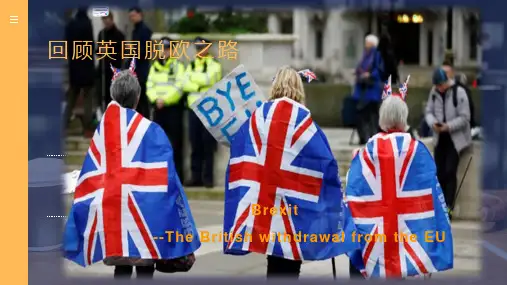
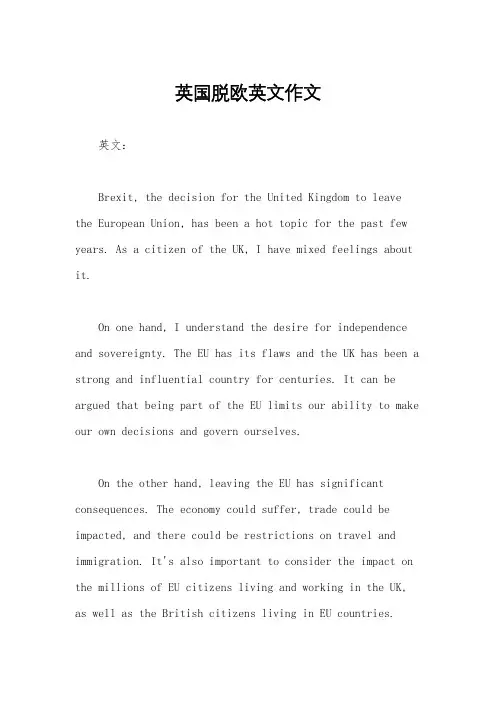
英国脱欧英文作文英文:Brexit, the decision for the United Kingdom to leave the European Union, has been a hot topic for the past few years. As a citizen of the UK, I have mixed feelings about it.On one hand, I understand the desire for independence and sovereignty. The EU has its flaws and the UK has been a strong and influential country for centuries. It can be argued that being part of the EU limits our ability to make our own decisions and govern ourselves.On the other hand, leaving the EU has significant consequences. The economy could suffer, trade could be impacted, and there could be restrictions on travel and immigration. It's also important to consider the impact on the millions of EU citizens living and working in the UK, as well as the British citizens living in EU countries.Personally, I believe that the decision to leave the EU was made too hastily and without enough consideration for the potential consequences. It's a complex issue with no easy answers, and I think it's important for the government to approach it with caution and care.中文:英国脱欧,即英国决定退出欧盟,成为过去几年的热门话题。
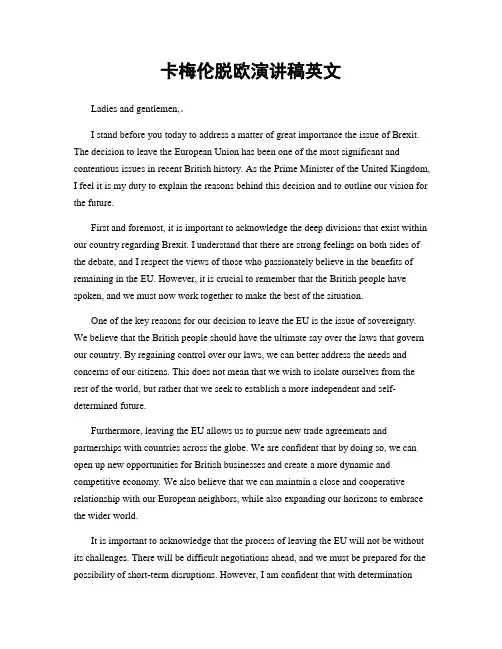
卡梅伦脱欧演讲稿英文Ladies and gentlemen,。
I stand before you today to address a matter of great importance the issue of Brexit. The decision to leave the European Union has been one of the most significant and contentious issues in recent British history. As the Prime Minister of the United Kingdom, I feel it is my duty to explain the reasons behind this decision and to outline our vision for the future.First and foremost, it is important to acknowledge the deep divisions that exist within our country regarding Brexit. I understand that there are strong feelings on both sides of the debate, and I respect the views of those who passionately believe in the benefits of remaining in the EU. However, it is crucial to remember that the British people have spoken, and we must now work together to make the best of the situation.One of the key reasons for our decision to leave the EU is the issue of sovereignty. We believe that the British people should have the ultimate say over the laws that govern our country. By regaining control over our laws, we can better address the needs and concerns of our citizens. This does not mean that we wish to isolate ourselves from the rest of the world, but rather that we seek to establish a more independent and self-determined future.Furthermore, leaving the EU allows us to pursue new trade agreements and partnerships with countries across the globe. We are confident that by doing so, we can open up new opportunities for British businesses and create a more dynamic and competitive economy. We also believe that we can maintain a close and cooperative relationship with our European neighbors, while also expanding our horizons to embrace the wider world.It is important to acknowledge that the process of leaving the EU will not be without its challenges. There will be difficult negotiations ahead, and we must be prepared for the possibility of short-term disruptions. However, I am confident that with determinationand a spirit of unity, we can overcome these challenges and emerge stronger and more resilient than ever before.In conclusion, I want to emphasize that our decision to leave the EU is not a rejection of our European friends and allies. Rather, it is a reaffirmation of our commitment to charting our own course and shaping our own destiny. We believe that by doing so, we can build a brighter and more prosperous future for the United Kingdom.Thank you.。